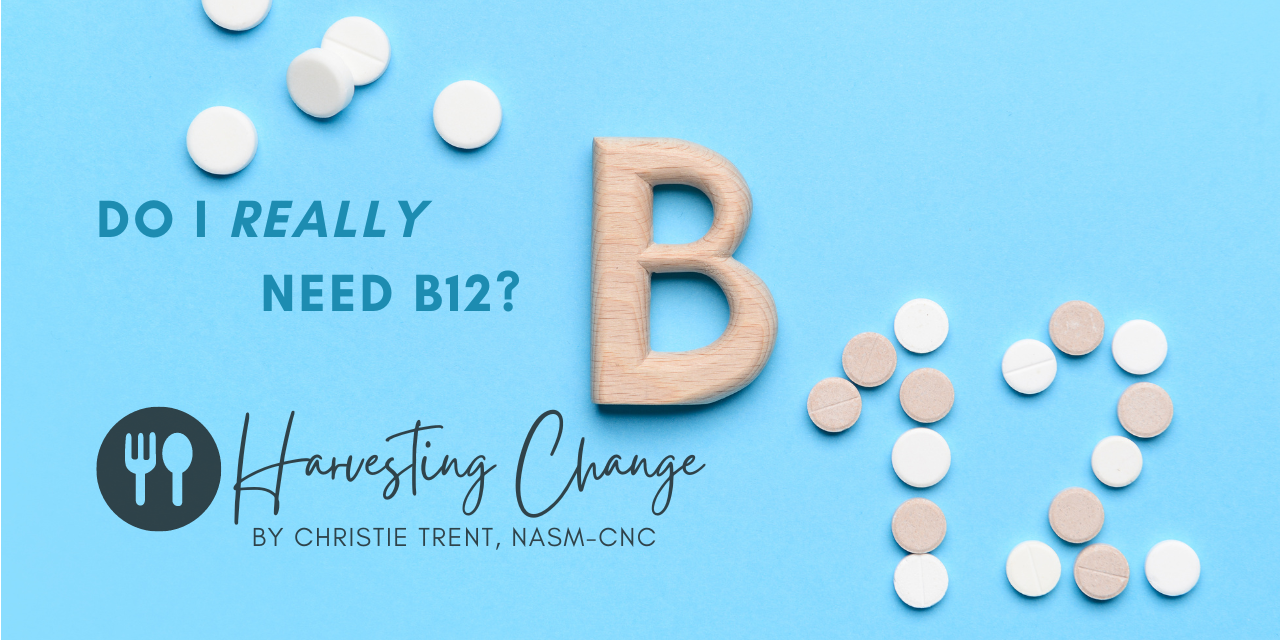
Understanding B-12
Disclaimer: The information provided in this post is for educational purposes only and is not intended as medical advice. It is essential to consult with a healthcare professional or registered dietitian before making any significant changes to your diet or beginning any supplementation, especially during pregnancy or if you have specific health concerns. Individual nutritional needs may vary, and the content provided here does not replace personalized guidance tailored to your unique health circumstances. Always seek the advice of your physician or other qualified health provider with any questions you may have regarding a medical condition or dietary change.
The vitamin that comes up in protest of a vegan diet is B12. “You need meat for that!” There are skeptics, eager to mock the notion of B12 supplementation, as if embracing a plant-based lifestyle immediately invites a vitamin deficiency crisis. However, here’s an important reality check: vitamin deficiencies can affect anyone, regardless of dietary choices. Factors such as medication, absorption issues, and underlying medical conditions can significantly influence our nutrient uptake. In fact, many individuals who consume meat may still find themselves deficient in B12. All nutrient deficiencies are a broader issue that transcends dietary labels.
Omnivores and B-12
Absolutely! Even omnivores and self-proclaimed carnivores can experience vitamin B12 deficiency. It’s important to remember that B12 originates from bacteria, not from the animals themselves. The livestock we consume are often supplemented with B12, and typically, this is in the form of cyanocobalamin, which is the least bioavailable and synthetic type of B12—more on that later.
If the meat you’re consuming is supplemented with B12, wouldn’t it make sense for you to consider supplementation as well, if you need it? Symptoms of B12 deficiency, like tingling in your hands and feet, can be quite sneaky. However, before you rush to the pharmacy, it’s wise to get a blood test to determine if you’re actually low—no need to guess! You can find a variety of at-home tests at Let’s Get Checked.
Can I Get Too Much B12?
Not exactly. You won’t “overdose” on a B12 supplement, as it’s generally considered safe even in higher doses. However, as with many things in life, too much of a good thing can lead to potential issues. Since B12 is a water-soluble vitamin, excess amounts are typically excreted in urine, but it’s still wise to approach supplementation mindfully.
Should I take a B12 Supplement?
That’s the million-dollar question! With B12, it’s pretty hard to overdo it. Here’s a fun fact: it takes years to run out of B12 thanks to your body’s impressive storage abilities. Yes, years! Think of your body as a B12 hoarder—it stashes it away in the liver like a doomsday prepper. Most people can go for several years without consuming B12 and still not become deficient. The average adult stores around 2 to 5 milligrams of B12, and since we only need about 2.4 micrograms a day, we’re talking serious reserves here!
B12 Stores
So, what exactly are “B12 stores”? Your body has a remarkable ability to store vitamin B12, primarily in the liver. In fact, the average adult can store about 2 to 5 milligrams of B12, which can last for several years. This means that even if you were to stop consuming B12 from your diet—whether through animal products or supplements—your body could still rely on these stores for a significant period before deficiency symptoms emerge.
The rate at which these stores deplete can vary from person to person, depending on factors such as age, overall health, and absorption efficiency. For most healthy individuals, it can take several years to deplete these stores, even if B12 intake is halted entirely. However, certain conditions, such as gastrointestinal issues or specific medications, can affect how well your body absorbs B12, potentially leading to a deficiency more quickly.
This storage capability underscores the importance of regular monitoring, especially for those on a plant-based diet or individuals who have limited intake of animal products. A blood test can help determine your B12 levels and whether you need to supplement, allowing you to take proactive steps to maintain your health.
B12 During Pregnancy
During pregnancy, adequate nutrition is crucial for both the mother and the developing baby. While the body stores vitamin B12, these reserves are primarily meant to meet the mother’s needs. Unfortunately, the baby doesn’t draw from these reserves, which means that without proper dietary intake or supplementation, a pregnant person may risk depleting their B12 levels. This can lead to deficiencies that may affect both maternal health and fetal development.
B12 is vital for producing red blood cells and maintaining a healthy nervous system, so healthcare providers often recommend B12 supplementation during pregnancy to ensure both mom and baby receive sufficient amounts for optimal health and development. By taking a B12 supplement, pregnant individuals can help safeguard against deficiencies, providing the necessary support for themselves and their growing child.
Types of B12
But if you’re in the market for a B12 supplement, remember not all B12 is created equal! Let me break down the main players:
Methylcobalamin – My Preferred Type of B12
- Energy production: Helps turn food into energy by metabolizing fats, proteins, and carbs.
- Brain function: Supports healthy nerve cells and neurotransmitters, keeping your brain sharp and your mood in check.
- Why I Like It: Methylcobalamin is the natural, bioactive form of vitamin B12 that’s naturally found in food. It’s already in the form your body can use, meaning it doesn’t need to be converted. It helps in the production of neurotransmitters that are important for memory, focus, and overall brain health. Methyl B12 also supports mood regulation, potentially reducing the risk of depression.
Cyanocobalamin
- Energy production: Like its cousin, methylcobalamin, it helps with energy metabolism and fights fatigue.
- Red blood cell formation: Essential for making those oxygen-carrying red blood cells.
Hydroxocobalamin
- Detoxification: Has been used to treat cyanide poisoning (yes, seriously) because it binds with cyanide and flushes it out.
- Red blood cell formation: Similar to cyanocobalamin, it helps prevent anemia by boosting red blood cell production.
Adenosylcobalamin
- Energy production: Breaks down fats, proteins, and carbs for energy.
- Nervous system health: Keeps your nerves functioning properly.
All these B12 forms work together to support your energy, brain power, and overall health. If you’re not sure which one’s right for you, I’m happy to help! Let’s set up a 30-minute consultation and get you sorted.


